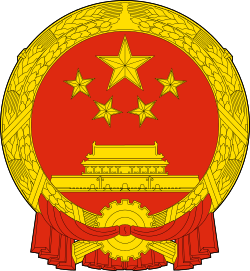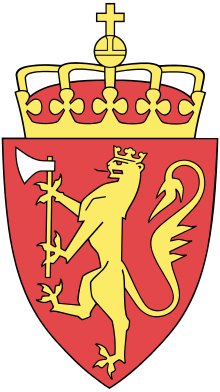China–Norway relations
 |
|
China |
Norway |
|---|---|

People's Republic of China – Norway relations officially started on 7 October 1950 and shortly after established diplomatic missions on 5 October 1954[1][2]
Timeline
- 2010
- 8 October: After the announcement of the next recipient of Nobel Peace Prize (Liu Xiaobo), the Chinese Foreign Ministry said it "will bring damage to two-way relations".[3]
- 8 October: The Ministry of Foreign Affairs (Norway) was notified that Zhao Fei (murder suspect) had been released from custody of police in China.[4] He was however imprisoned in 2013 and was under trial in 2014, and he admitted guilt.[5]
History
The first Norwegian diplomatic mission was founded 1851 during the union of Sweden and Norway. This was established in Guangzhou.[6] In 1853, a new vice consulate was set up in Shanghai. By 1863, Shanghai became the Consulate General and the branch in Guangzhou was relegated into a vice consulate.[6]
It was not until 1905 when Norway was split from the union with Sweden it had its own China's diplomatic mission.[6] A year later, the first official visit from the Qing Empire took place with Dai Hongci, Chairman for the Imperial Court's Cultural Department.[6]
Bilateral relations
The commencement of diplomatic relations between the two countries nearly 60 years ago has progressed from cultural and political exchanges to trade ties such as economy, industry and technology.[1]
In 2003, the volume of the bilateral trade between China and Norway was US$1.76 billion. Bilateral trade has steadily increased over the years.[1]
In 2008, the export value from Norway to China is $1.93 billion and exports from China to Norway were up to $5.43 billion.[7] In 2009, Norway's exports to China increased by 39 percent to a value of $2.28 billion.[7] Exports, consisting of equipment, chemicals, optical and medical appliances, have gone up.[7] China's exports to Norway amount to some $5.25 billion, increasing by 4.5 percent from last year.[7]
China's largest exports to Norway were ships, textiles and garments, and mechanical and electronic products.[1]
Norway's largest exports to China were crude oil, mechanical and electrical products, fertilizer, construction, mining equipment, factory and plant equipment, and salmon, as well as raw metals.[1][8][9]
2010 Nobel Peace Prize
The Chinese-Norwegian relationship ran into a large setback in 2010 because the Norwegian parliament-appointed Norwegian Nobel Committee awarded the prize to an incarcerated Chinese man, Liu Xiaobo. China reacted strongly, saying that relations between their two countries had been damaged.[10][11][12][13] A planned meeting in Beijing between Norwegian Fisheries Minister Lisbeth Berg-Hansen and Chinese food control authorities was cancelled at the last minute, ostensibly because their counterparts had "other engagements"; Norwegian officials said that a meeting due to be held the same day between Berg-Hansen and the Chinese vice-minister for fisheries had been cancelled in reaction to the award. Elsewhere, performances of a Norwegian musical scheduled for the following month starring Alexander Rybak, winner of the Eurovision Song Contest 2009, also fell victim to the diplomatic fallout, according to the musical's composer.[14] In early December, Norway announced that its bilateral trade talks with China had been indefinitely put on hold. Haakon Hjelde, Norway's negotiator alleged the postponement was not directly linked to the award, but Henning Kristofferson, director of international relations of the BI Norwegian School of Management, was certain that this was a retaliatory move. He said that Beijing had been "very clear that the prize was a big mistake and that it would damage relations."[15]
2011
Press secretary of Norway's foreign ministry (Hilde Steinfeld) confirmed in November 2011, the absence of bilateral talks during the last 12 months.[16]
The finance committee of Norway's parliament, cancelled its planned trip (studiereise) to China in spring 2012, after not having secured appointments with any leading government representatives of China.[17]
Klassekampen wrote that Norwegian "war ships are being directed to Northern areas (nordområdene) because nations like Russia and China are showing increased interest for the natural resources of the North. — This is an important region for resources, and a number of nations are showing their interest there, but there is no imminent threat, says Minister of Defence Espen Barth Eide".[18]
2013
The standoff continues into 2013 with unofficial Chinese restrictions on Norwegian salmon and visas and China comparing Norway's action to a noose around the tiger's neck.[19]
2014
A 22 April 2014 NRK article said that by not having Norwegian officials meet with Dalai Lama during his upcoming visit, "one sends a quite unfortunate signal, not only to Chinese authorities but to people in Tibet who are exposed to ever increasing repression".[20] A same day Dagbladet op-ed said that "We, as a nation, come across as being led by a president of parliament (and a Government?) that live by the moral [that] the brakkebaronene lived by during the war: Close the eyes for violations of human rights, forget the occupation, money trumphs [or decides]".[21]
References
- 1 2 3 4 5 "China and Norway". Mfa.gov.cn. 22 August 2011. Retrieved 29 September 2011.
- ↑ "Norway – China 55-year friendship". Norway.cn. 30 October 2009. Retrieved 29 September 2011.
- ↑ "BBC News – International reaction to Liu Xiaobo Nobel Peace Prize". BBC. 8 October 2010. Retrieved 29 September 2011.
- ↑ Dagbladet, 2010-12-02, "Drapet i Budapest" by Anders Holth Johansen, page 18
- ↑ NRK "Rettssak mot Zhao Fei ferdig" http://www.nrk.no/norge/rettssak-mot-zhao-fei-ferdig-1.11801612
- 1 2 3 4 "A Brief History of Sino-Norwegian Diplomatic Relations". Norway.cn. Retrieved 29 September 2011.
- 1 2 3 4 "Speeding up Norway-China Free Trade Negotiation Process_Observer_EUROPECHINA ECONOMIC & TRADE OBSERVATION". Europe1china.com. 25 January 2010. Retrieved 29 September 2011.
- ↑ "The Norwegian Minister of Trade and Industry Mr. Trond Giske Visits China". Norway.cn. 13 January 2010. Retrieved 29 September 2011.
- ↑ "Norwegian Minister of Trade and Industry visits Guangdong". Norway.cn. 14 June 2010. Retrieved 29 September 2011.
- ↑ MacKinnon, Mark (9 October 2010). "Jailed dissident’s Nobel Peace Prize infuriates China". The Globe and Mail. Retrieved 9 October 2010.
- ↑ Branigan, Tania (8 October 2010). "Liu Xiaobo Nobel win prompts Chinese fury". The Guardian. Retrieved 8 October 2010.
- ↑ Jiang, Steven (8 October 2010). "China blanks Nobel Peace prize searches". CNN. Retrieved 8 October 2010.
- ↑ Bagchi, Indrani (9 October 2010). "Nobel to Liu caps horrible year for China". The Times of India. Retrieved 9 October 2010.
- ↑ Deshayes, Pierre-Henry (12 October 2010). "China cancels Norwegian meetings, musical over Liu's Nobel". The Times of Earth. Agence France-Presse. Retrieved 10 June 2011.
- ↑ Fouche, Gwladys; Gibbs, Walter (30 November 2010). "China postpones Norway talks as Nobel tensions rise". Reuters. Retrieved 10 June 2011.
- ↑ http://www.vg.no/nyheter/utenriks/kina/artikkel.php?artid=10024175"En del samarbeidsområder fortsetter, men det har ikke vært bilaterale samtaler det siste året, forteller kommunikasjonsrådgiver Hilde Steinfeld."
- ↑ http://www.vg.no/nyheter/utenriks/kina/artikkel.php?artid=10024175"Ingen ledere vil møte norske politikere ... Vi har lenge ønsket dette, men de har sagt at vi ikke kommer til å få til så mange møter. Da er det heller ikke noen vits å reise, sier Gunvor Eldegard (Ap). Hun er leder av finanskomiteens reisekomité. — Jørund Rytman (Frp) sier at komiteen valgte å skyve på studiereisen fra høsten 2011 til mars 2012 i håp om at forholdene skal normalisere seg, men så langt er det ingenting som tyder på at kineserne vil ta Norge inn igjen i varmen. Nå kan de ikke vente lenger. — Dette er jo veldig beklagelig. Kina spiller en dominerende rolle i verdensøkonomien. Derfor var det et ønske fra hele finanskomiteen å reise dit, sier Rytman, som også er medlem av reisekomiteen. — Høyres finanspolitiske talsmann Jan Tore Sanner tar kinesernes beslutning til etterretning. — Vi hadde en ambisjon om å reise dit, men tar til etterretning at det ikke lar seg gjøre. Ansvaret ligger på kinesiske myndigheter. Vi har ingenting å beklage."
- ↑ "Forsvaret vil beskytte nord". Klassekampen (in Norwegian). 2011-12-03. p. 16.
Forsvaret sender flere krigsskip til nordområdene fordi land som Russland og Kina viser økt interesse for naturressursene i nord. — Dette er jo en viktig ressursregion og en rekke land viser interesse for dette området, men det er ingen akutt trussel, sier forsvarsminister Espen Barth Eide.
- ↑ Beam, Christopher (28 October 2013). "Why Is China Snubbing Norway?". www.realclearworld.com. THE ASSOCIATED PRESS. Retrieved 29 October 2013.
- ↑ Amnesty: – Meget uheldig signal å si nei til Dalai Lama
- ↑ Kronikk: Kapitulasjonspresidenten ["Op-ed: The capitulation-president"]
External links
- Hellstrom, J. (2014) China’s Political Priorities in the Nordic Countries, Swedish Defence Research Agency (FOI)
- Chinese Embassy in Norway (Chinese)
- Royal Norwegian Embassy (Norwegian)

